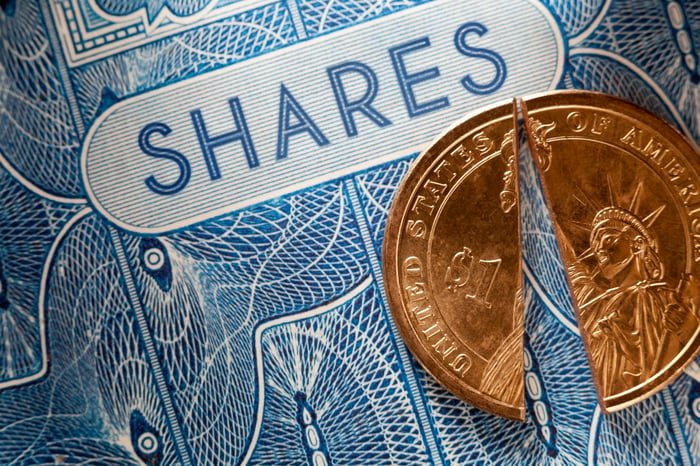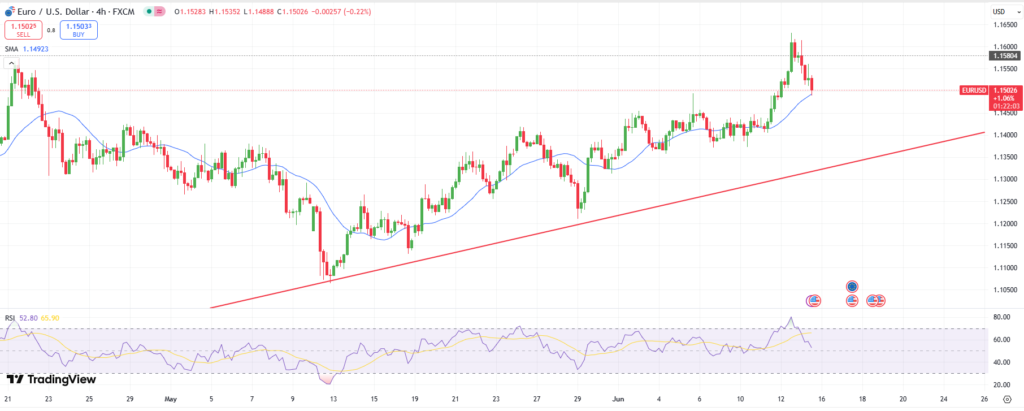CEO of Chime, Chris Britt, center right, rings the opening bell during the company’s initial public offering at the Nasdaq MarketSite on June 12, 2025 in New York City.
Andres Kudacki | Getty Images
Chime opened at $43 in its Nasdaq debut on Thursday after selling shares at $27 each in an IPO that valued the online banking company at $11.6 billion.
Late Wednesday, Chime raised about $700 million in its offering, and existing investors sold an additional $165 million worth of shares. The stock is trading under the ticker symbol CHYM.
Chime’s initial public offering, from a valuation perspective, represents a big step down from where venture investors like Sequoia Capital valued the company in its last fundraising round in 2021, when private tech markets were raging. The valuation at the time was $25 billion.
Still, Chime’s offering is the latest sign that the fintech IPO market is opening up after a multi-year freeze brought on by rising interest rates and valuation resets. Recent debuts from eToro and crypto company Circle have rekindled optimism in the sector, with both stocks seeing strong initial pops.
Chime reported $518.7 million in revenue for the most recent quarter, a 32% increase from a year earlier. Net income narrowed slightly to $12.9 million, down from $15.9 million in the same period last year.
CEO Chris Britt said Chime has built a loyal user base by serving Americans earning $100,000 a year or less, a group often overlooked by traditional banks.
“Two-thirds of our customer base use us as their direct deposit account and primary account relationship,” Britt told CNBC’s David Faber. “We help our members avoid fees, get access to short-term liquidity, build their credit and build their savings — and it’s that combination of services that really resonates and matters most to the everyday consumer.”

Britt said the company reached $25 million in adjusted profitability in the first quarter and has improved its adjusted profit margin by 40 points over the past two years.
The company’s top institutional shareholders are DST Global and Crosslink Capital. Iconiq was one of the firms that invested six years ago, when Chime raised money at a $1.5 billion valuation.
“We first invested in Chime in 2019 and continued to invest through subsequent rounds because of their singular, unwavering focus on serving everyday Americans — and the trust they’ve built with that core customer base,” Yoonkee Sull, general partner at Iconiq, said in an interview.
The average Chime customer completes more than 55 transactions per month using the Chime card and interacts with the app four to five times a day. Active member growth rose 23% in the first quarter from a year earlier, Britt said, with 8.6 million monthly active users and an increasing number turning to Chime to serve as their primary banking relationship.
Customer acquisition doesn’t come cheap. Chime disclosed in its prospectus that it spent $1.4 billion on marketing between 2022 and 2024. Britt said the retention rate is above 90% once users set up direct deposit.
“Sometimes for people, it takes a change in life — a change in their career, a job change — to be the point in time when they actually make the switch and use us as a primary bank account,” he said.
The company’s core revenue comes from interchange fees, the charges merchants pay when consumers swipe Chime-issued debit or credit cards. Britt said 72% of Chime’s revenue is payments driven, versus traditional banks that rely heavily on fees from overdrafts and minimum balances.
“It’s pretty simplistic,” said Dan Dolev, an analyst at Mizuho. “I’m actually surprised by how unsophisticated that business model is.”
Chime’s performance in the public markets may set the tone for what comes next. Several other fintech players, including Klarna, Gemini and Bullish, have already filed for IPOs publicly or confidentially.
“If it goes well — and you’ll know that in the next two to three months — I think you’ll see much more receptivity” from other companies in the pipeline, said David Golden, partner at Revolution Ventures and former head of tech investment banking at JPMorgan Chase.
“If it doesn’t go well,” Golden added, “I think they’ll continue just to sit on their hands and wait it out.”
Chime is a five-time CNBC Disruptor 50 company, having made the annual list from 2020-2024.






